Gardening for depression is a proven therapy that works! Here’s a bit about horticultural therapy, and how getting out into nature has been a life-changing part of my own healing from depression.
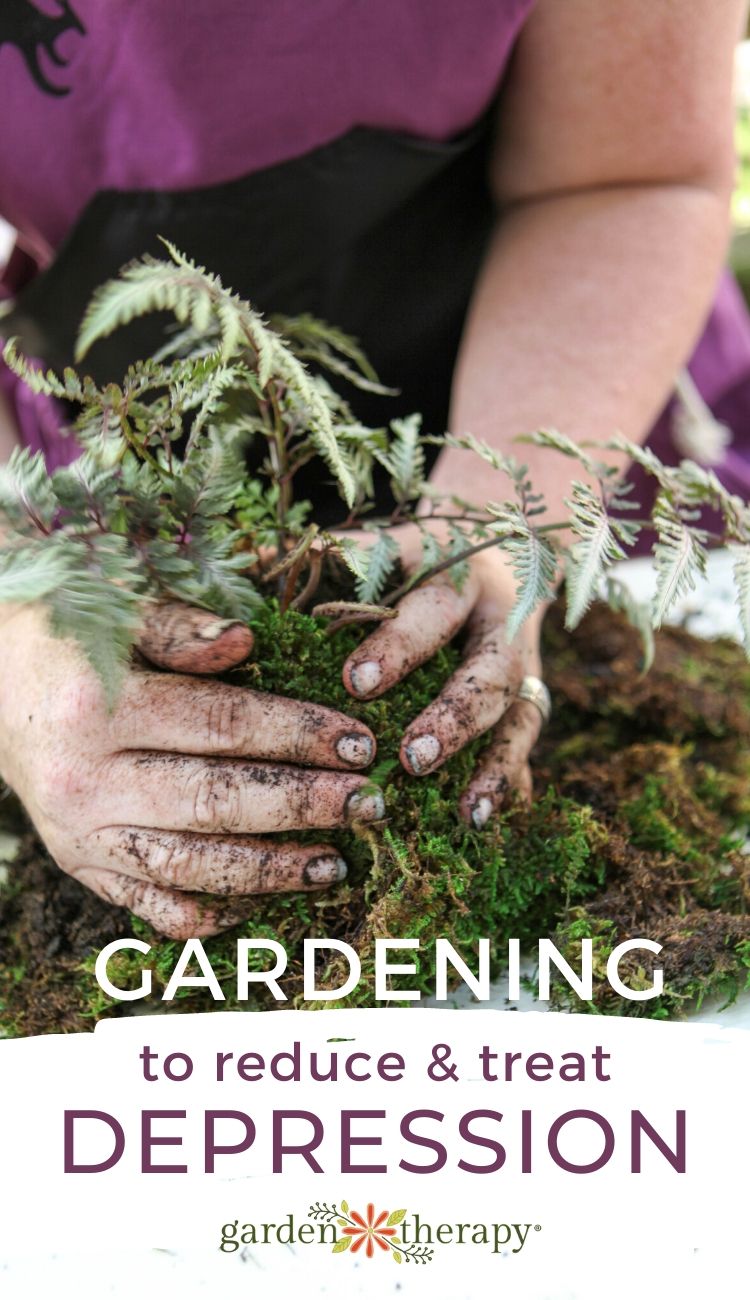
The garden has many lessons for us. While you may see a strong leaf or flower, it all began with a tiny seed. That seed had to grow roots and push through dirt before it ever saw a hint of sunlight. It can survive through drought, a lack of proper nutrients, and minimal sun. Plants are resilient and strong, growing oftentimes when we thought it was never possible.
Humans too are strong and resilient, but like plants, we also face many challenges in order to grow and succeed. According to the World Health Organization, “Depression is a leading cause of disability worldwide and is a major contributor to the overall global burden of disease.” It affects all genders, cultures, incomes, and ages.
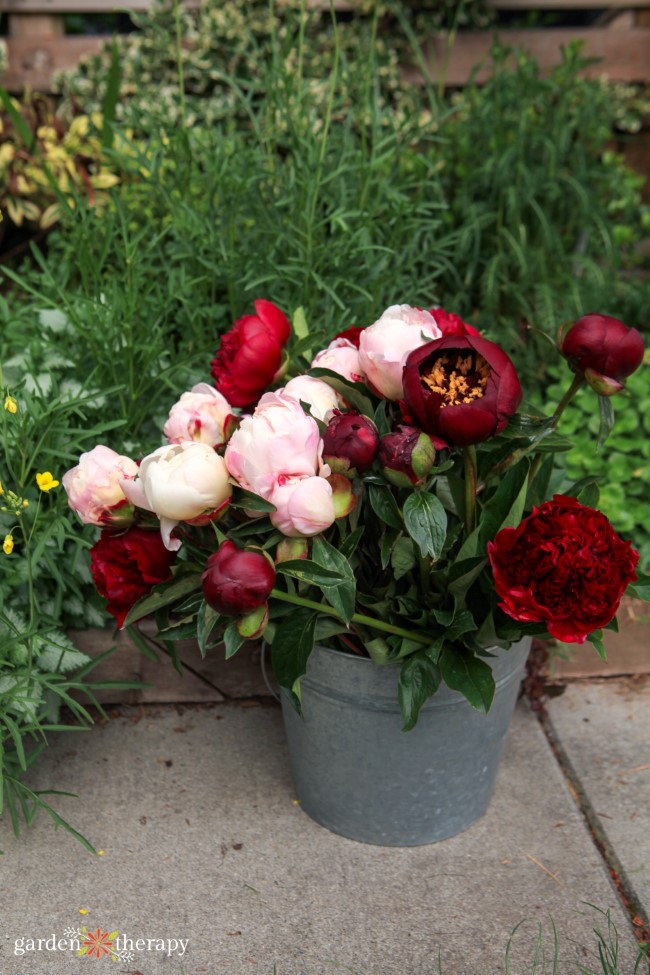
Depression by the Numbers
The Canadian Mental Health Association states, “Approximately 8% of adults will experience major depression at some time in their lives.” They also say, “by age 40, about 50% of the population will have or have had a mental illness.”
Numbers in the USA are similar. The National Institute of Mental Health citing 7.1% of US adults experiencing at least 1 major depressive episode. These are major numbers affecting many Canadians and Americans. Whether you know it or not, there are people all around us experiencing depression and other mental illnesses.
Everyone copes differently with depression. Some seek help from trained health professionals and others use medication. Some turn to friends and family, while others busy themselves. However someone wants to seek help is completely valid; what is important is that they’re seeking help and wanting to get better.
But what I want to talk about today is how gardening, nature, and horticultural therapy can aid in the treatment of depression.
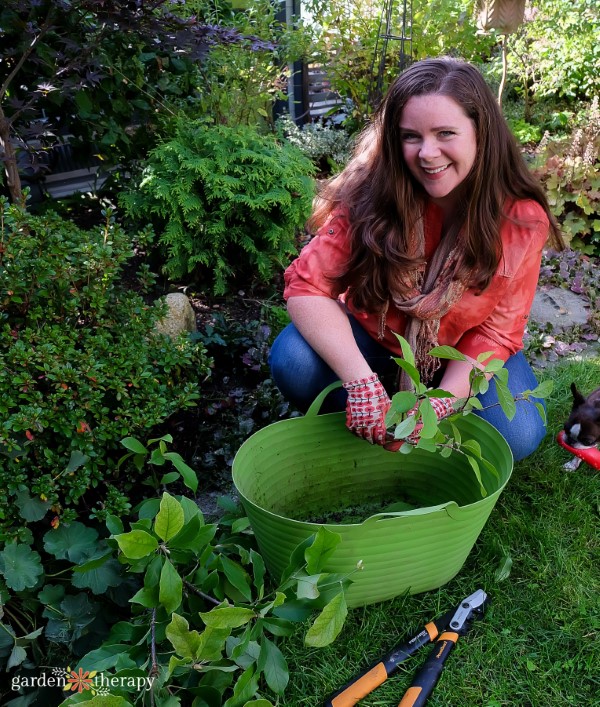
My History of Dealing with Depression
In my mid-twenties, I was diagnosed with clinical depression. I was feeling sad and hopeless, despite my life seeming to be pretty great on the surface. What people couldn’t see was the hard childhood I survived through. When I seemingly had myself together as a young adult, I slowed down survival mode enough to feel some of those hard feelings.
It came on quickly, but I didn’t quite notice it like you do a virus or broken bone. I was lucky that a dear friend pointed out that I seemed sad. So, I went to my family doctor for help. She prescribed anti-depressants, the Feeling Good Handbook, and to get out into nature daily. I was feeling much more like myself in only six months, but I know that many folks struggle with it for years, decades even.
I finished the meds and the handbook but kept nature as part of my life. Although I admit, it got away from me for a bit of time. As I graduated from school, got married, bought a house, and worked in my corporate job, I was in that rat race that kept me a bit too busy for nature time.
The Beginnings of Garden Therapy
Then, as you may know from my story of how Garden Therapy started, I became suddenly and severely disabled overnight. I had to stop working and could barely get out of bed.
And guess who came back? Yep, my old friend, depression. This time, I was situationally depressed, as opposed to clinically, meaning that the loneliness and fear of my life getting turned upside down was the clear cause. So, I opted to skip the anti-depressants and change my situation instead with horticultural therapy.
I remembered my doctors advice: to get out into nature daily. Since I was physically limited in what I could do, I went out into my yard. I used the space just beyond my door to learn how to garden and connect with nature. I started this blog as a way to meet other people who were passionate about the healing powers of gardens to combat my loneliness.
It worked like a dream! But now, even all these years later, I still find myself getting a bit blue if I don’t take time to slow down and plant/smell/pick the flowers. I make time for gardening every day. I have aso logged my ideas for gardening as therapy since 2009 on the pages of this website in order to maintain mental wellness.
More than anything, I’m grateful to have met all the people that share this passion for healing and gardens. Through this blog and my horticultural therapy, I’ve made lifelong friends and have turned writing about garden therapy into my full-time job.
Gardening for Depression and Horticultural Therapy
What I’ve noticed over the years is that more and more, people are beginning to turn to gardening as a wellness activity. Around 57% of the total population of Canada gardens, 40% in the UK, and 1 in 3 people in the US. Many studies have shown what I experienced: that frequent contact with nature and the outdoors have a lasting effect on people’s mental health. Whether it’s farming, gardening, or a walk outside, I’m sure you have experienced the calming effects of the outdoors as well.
There is an official term for using the garden as a therapy practice. Horticultural therapy (also called therapeutic horticulture) is when people engage in gardening or plant-based activities facilitated by a trained therapist to aid in their recovery and goals.
That is not what I do here on Garden Therapy. I’m not trained at horticultural therapy. However, the projects and ideas that I share on this website have been used in many therapy programs around the world. My ideas are laid out in a way they are easy for folks to replicate, but the concept is nothing new.
Before horticultural therapy was defined, many state hospitals in the USA actually had crops on hospital grounds. Since many patients in the hospitals farmed, working on the crops was familiar to them and provided them with comfort. Later on, legislation said a patient could not work while being in the hospital and this opportunity was taken away. People no longer could get outside and enjoy the fresh air, instead, staying inside watching TV.
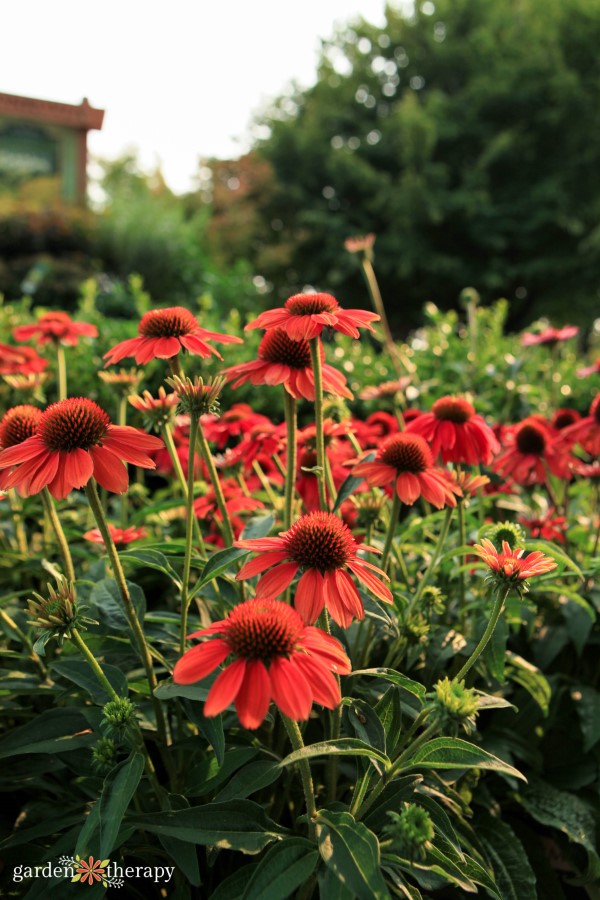
Horticultural Therapy for Depression is Proven (and not just by me)
While gardening is a great hobby that (of course) I highly recommend, it has been proven to help with depression. A study from 2011 focused on individuals with clinical depression and had them prepare gardening beds, plant seeds, and cultivate plants over 12 weeks. At the end of the program and 3 months later, the severity of the depression was significantly reduced. 96% of the participants said that the experience working with the plants was meaningful.
Another study focused on individuals with disabilities and gardening for depression. It found that those who participated in gardening 4 to 6 times a week had lower overall depression index scores. Lifetime gardeners had significantly lower depression scores than non-gardeners with an average of 2.7 fewer depression points.
Most of us may not officially be participating in horticultural therapy with a trained therapist. However, we are doing it on our own every time we step into our gardens. The physicality of gardening has us outside and working our limbs in many different ways. There are social benefits every time we garden with a friend or connect with a stranger about our shared passion for plants. There are proven physiological benefits to being outside with nature and connecting with plants.
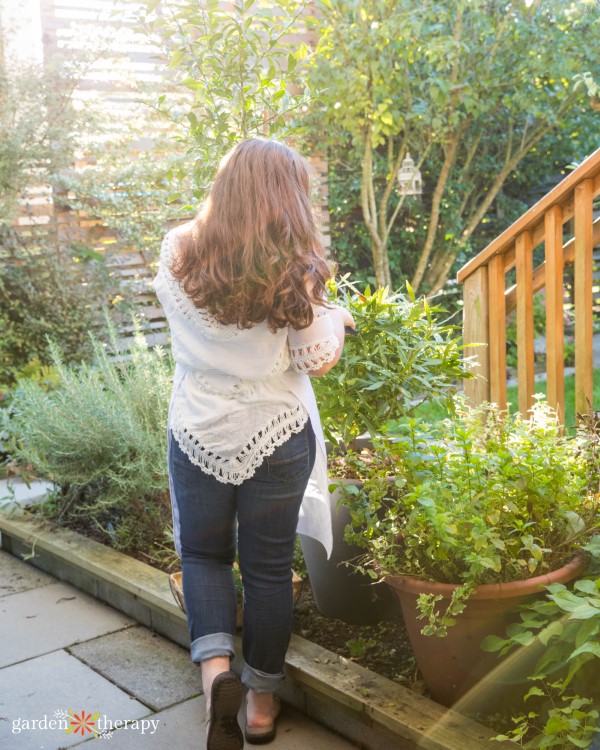
How Gardening Boosts Our Spirits
Did you know that getting down and dirty while gardening is actually good for you? Getting in contact with specific soil bacteria, Mycobacterium vaccae, can actually activate the release of serotonin in the brain. Low levels of serotonin have been linked to depression as well and studies show that the soil bacteria actually act in a similar way to antidepressants.
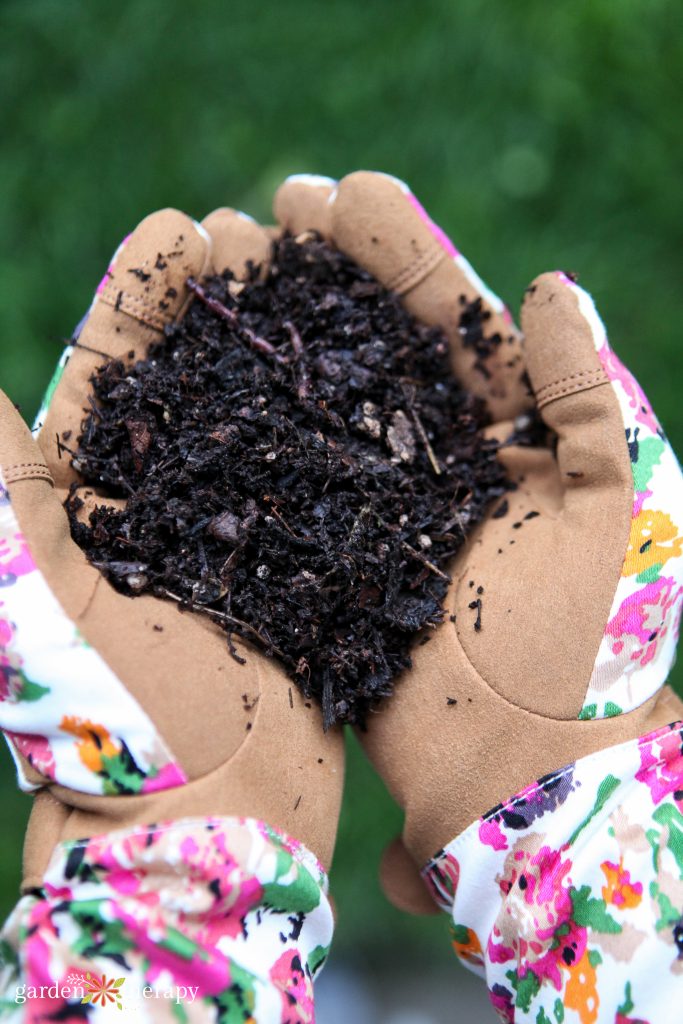
But it doesn’t just stop at the soil; there is also a proven “harvest high” every time a gardener harvests fruits, vegetables, or herbs. The hypothesis is that over thousands of years as humans have evolved, hunting and gathering meant survival. If you found something to feed you, you felt happy and relieved. Harvesting actually triggers dopamine in the brain, providing an immediate feeling of joy.
It’s cool to think that every time we pull a carrot up or pick out some Swiss chard, our brains are actually receiving these happy chemicals. Long after these harvests bring that initial joy, they remain a comfort in my life. From canning my food to using fresh herbs year long, I grow a ton of edible plants with the idea of enjoying them during every season. Every time I don’t have to go to the grocery store for an ingredient because I grew it myself gives me a ton of pride and satisfaction at being as self-sustaining as possible.
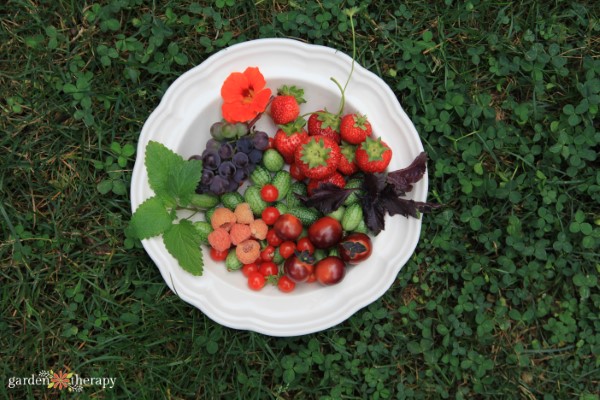
Grow Healing Gardens
Beyond eating my harvests, I have a large healing garden planted to sustain my home apothecary. I make all of my own skincare products, from healing salves and bug bite treatments to soaps and lotions. But I also grow herbs to aid me with other issues, such as chamomile for sleep, feverfew for headaches, lavender for relaxation, and many more.
What you grow in the garden itself can make a huge difference. Whether it is growing your own healing garden, a huge plot full of veggies, or a backyard teeming with beautiful blooms, grow whatever makes you happy.
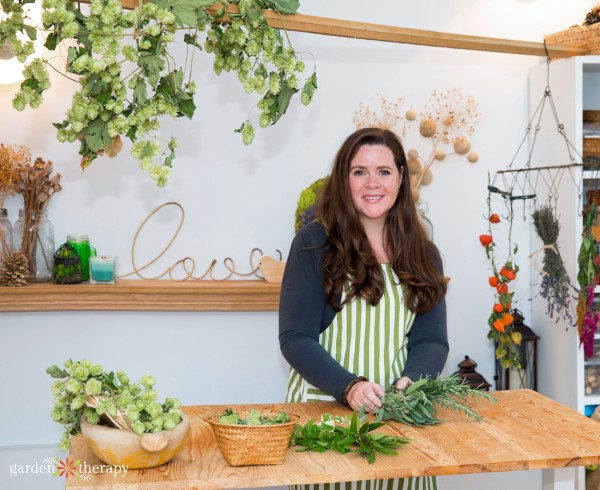
Gardening teaches us a growth mindset. The next time you see a flower growing through concrete, think about its resiliency. It is surviving despite all the difficult conditions the world has thrown at it. In order to achieve a great harvest, there is a lot of time, patience, and care that goes into its success.
Just like the garden, we can’t expect our friends, families, or even ourselves to have instant results or joy. Depression is a very treatable illness that often goes unnoticed by others. There is no shame in seeking help and proper treatment. If you or someone you know may be experiencing depression, I encourage you to consult with a healthcare professional. Together we can break the stigma and together we can get help.
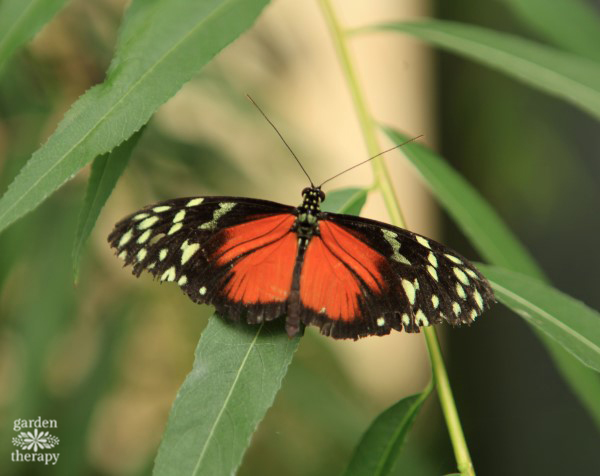

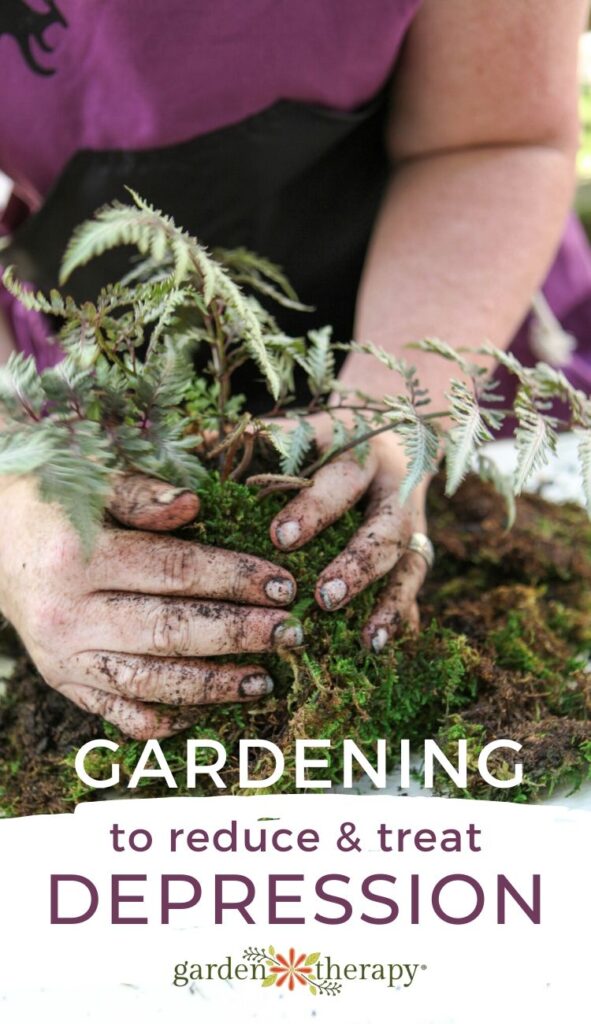
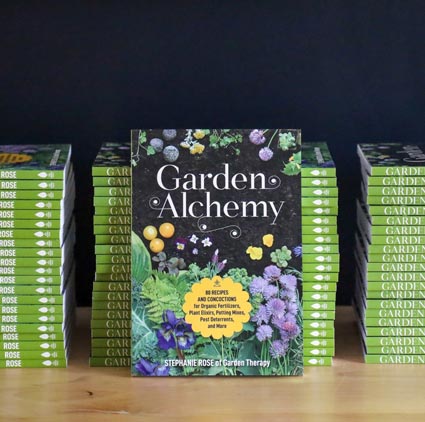
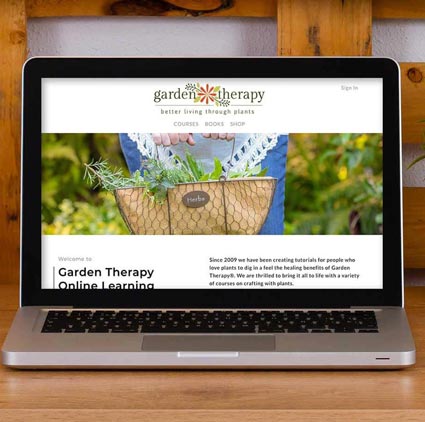

This is nice, thanks for sharing your blog.
Hi Stephanie,
I just love this article , it really touches me ,.
My 26 yr old dauhter in a motorbike crash about 18mth ago . It is a very long cruel road to walk . But i have always loved my garden and I have found that it is a safe haven , a calming and gentle place . So as well as the happy pills ,it is my go to.
thank you for making more people aware and for sharing your own story .
Deb
Oh Deb, I’m so sorry. Sending you so much love.
I love your blog. I feel like you are writing aboutmy life instead of yours! It is so relatable. Keep up the good work!
I just started looking at you blog and this one caught my eye. As a professional in the field of Horticultural Therapy, I want to tell you how valuable I believe this specific article and your blog is. You are reaching a wide audience with a very important message. In addition to helping so many individuals with a wise message for their daily life, many of your readers are likely in healthcare professions and are likely motivated to explore gardening as a way to treat their clients. Thank you for what you are doing.
You may consider attending or sharing information with your readers on the first international virtual joint symposium on the Role of Horticulture on Human Well Being and and social development and Horticultural Therapy. Please look at the webpage. By mid August there will be a complete program posted for better insight into what is covered. You may also consider being a sponsor , as I believe many of the attendees would benefit for you blog. Please email if you would like more contact with me.
Diane Relf pdrelf@vt.edu
I feel so honored that you shared your Depressiin story with all of us. And, as a person battling Depression myself, I learned a lot. Thank you sooooooooo much!!!!
With blessings,
Kimberly from Indiana, US